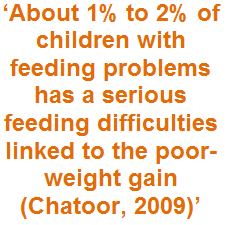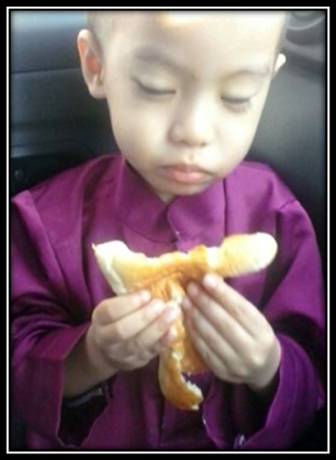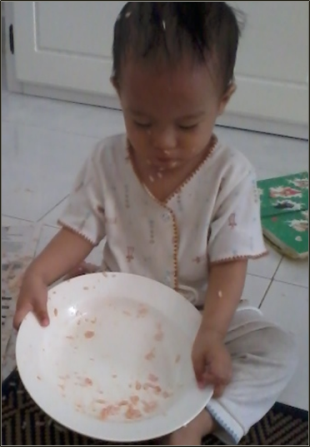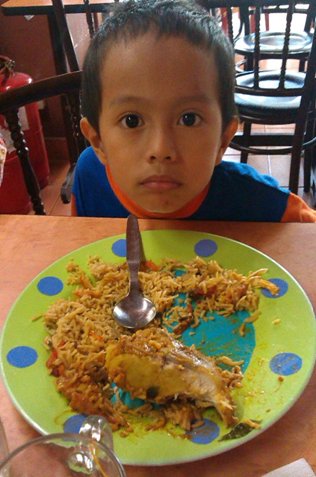Introduction
Children started the feeding skills by sucking their fingers in the womb. It continues to develop until they are able to enjoy eating adult’s food. However, about 25% of normal children are facing feeding problem (Chatoor, 2009). It is also estimated that 80% of children with developmental problem have been reported to have this problems (Chatoor, 2009).

Poor feeding skills also can be associated to many other developmental areas problem such as
- Poor motor skills development
- Poor behavioral skills
- Emotional problems
Children with feeding difficulties usually display;
- Choking
- Picky eaters
- Vomiting
- Failure to thrive.
Feeding problem usually manifested as the child refused to eat.
Adult can choose what they want. They can verbalize what they prefer; they can tell people what they don’t like. Unfortunately, children did not have the ability or power to do so. These are some kind of food that usually children dislike;
- Hard food like biscuits
- Pureed food like apple puree
- Soft food like jellies
- Sticky food like nougat chocolate
Others just prefer,
- gravy food like curry
- sweet food like sweets
- milk only
Behavioral Feeding Problems
Behavioral feeding problems include all other problem behaviors that take place around meals. Children with this problem often displayed;
- Refuse to sit at the table for meals

- Refuse to self-feed when he/she is able to do so
- Throwing food during mealtime
- Stealing food from others
- Crying or screaming or vomiting to escape from the meal
- Other disruptive mealtime behaviors
Sensory Feeding Problems
Children who are facing this problem usually feel overwhelmed and uncomfortable with the way the food is present;
- Looks
- Tastes
- Smells
- Feels
Difficulty to move from one texture to another is one of the common problems they have. Children with sensory feeding problem usually;
- Have difficulty to let go liquids or pureed,
- Did not want to try foods with more texture.
- Unable to control gagging or vomiting as their reaction to foods.
Other Kinds of Feeding Problems
Delayed developmental skills and medical status are also factors that can cause feeding problem. The clinician must identify the exact root cause carefully as usually the presentation is almost same. Hence, the treatment strategies are differing to one another cause.
Children who have behavioral feeding problem
Children who may have risk of behavioral feeding problem include:
- Children with autism
- Children with developmental delay
- Children with poor support.
- Etc
Managing behavioral feeding problem
*Strategies discussed here can be varied base on the needs of a child. Please take note that these may not appropriate for all children with behavioral feeding problem.

- Show Good Example
Parents should show a good example when eating or during meal time. Parents can introduce a rule during mealtime that implies on all family members. Example; Nobody is allowed to sit in front of the television during mealtime as they must sit together at the dining table.
Setting a common rule for all will allow the child to observe parents and siblings behavior and reaction towards mealtime. Child will remember it and soon will be able to regulate with it.
- Break Each Goal Into Small Steps A child will perform better if they can easily achieve the target goal/step. Break the goals into a small step and tolerable to the child. Thus, higher chances can be achieved towards the end of the goal.
- Reward Each Step Praise and reward the child after completing/achieving each step. Give a reward by praising the child or by giving a highly appreciated reinforcement to motivate the child to continue the good feeding behavior. Praise and reward the child after completing/achieving each step. Some children may need repetitions to follow the steps. It can take over series of meals, or days or weeks before they are able to complete the small step without difficulty.
- Start From Zero A child needs to complete the specific small step/ task to earn their favorites. This technique is better to be applied with older children.
- Resistant and Destructive Children
Some children may become very resistant to tolerate small steps/changes. This change will lead to undesirable behaviors. It is even worse when the change increases his undesirable behaviors. Some of the children may initially cooperate with new plan and then backtrack or become resistant.

A feeding plan for destructive behaviors children must be carefully designed and monitor to keep children and family safe. Multidisciplinary professional guidance is required in all of these cases
Which Technique is Suitable?
Parents should seek professional helps to determine what kind of feeding problem the child has and what strategies are likely to be more effective. Usually an interdisciplinary feeding team consists of professionals that involve in managing feeding problem can provide a comprehensive feeding plan for the child.
The interdisciplinary feeding team usually consists of;
- Speech-Language Therapist,
- Dietitian
- Occupational Therapist,
- Children Psychologist
- Pediatrician.
Therefore, if parents have any issue regarding their children’s feeding situation, do consult these experts. The child should be evaluated by a trained clinician as early as possible to maintain the child’s good health.
References
- Chatoor, I. (2009) Diagnosis and Treatment of Feeding Disorders in Infants, Toddlers and Young Children. Washington DC
- Behavioral and Sensory Feeding Problems http://nutrition.cedwvu.org/feeding-and-swallowing-clinic/behavioral-and-sensory-feeding-problems.php
- Morris, S.E. & Klein, M.D (2000) Pre-Feeding Skills 2nd Edition. United States of America
| Last Reviewed | : | 28 August 2020 |
| Writer / Translator | : | Maryam bt. Aizuddin |
| Accreditor | : | Nurshahira bt. Razali |
| Reviewer | : | Nadwah bt. Onwi |







